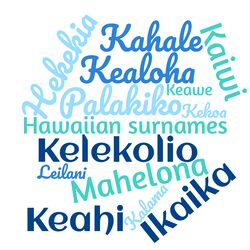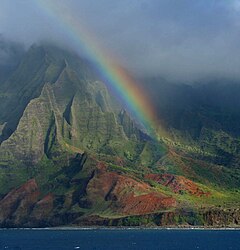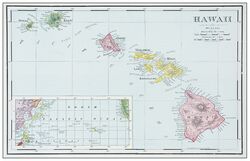
Hawaiian surnames, deeply entwined in the rich tapestry of the Pacific island's cultural heritage, are a fascinating blend of indigenous traditions and diverse influences from the many cultures that have interacted with Hawaii over the centuries.
Traditionally, native Hawaiian family names, or "Inoa," are not just identifiers but carry profound spiritual significance, often rooted in ancestral lineage or the circumstances surrounding a person's birth.
However, the colonial era brought a significant shift, incorporating Western, Asian, and Polynesian elements into the nomenclature, creating a unique mix that reflects Hawaii's vibrant multicultural identity today.
History of Hawaiian Surnames
Traditionally, surnames were not used in ancient Hawaii. However, outside influences such as the introduction of Christianity and American control have changed naming practices in Hawaii, particularly regarding the use of surnames.
Surnames began to be used for different reasons. Following the introduction of Christianity in the 1820s, Christian Hawaiians may have opted to use a Christian name as a first name and their Hawaiian name as a surname when they were baptized. Many Hawaiian Christian names derived from English look quite different in Hawaiian, as the alphabet only has thirteen letters.
Surnames weren’t widely used until later in the 19th century. In 1860, Kamehameha IV signed into law the 1860 Act to Regulate Names.[1] This law had Hawaiians commonly adopt their father’s given name as their surname, use a Christian name as their first name, and use their Hawaiian name as their middle name. Additionally, a married woman took her husband’s name under this law. An illegitimate child was to take the mother’s name as a surname. The 1860 Act to Regulate Names stayed in place until 1967, and therefore, many Hawaiian surnames today are derived from the father’s first name.
Additionally, many surnames in Hawaii are the result of external influences, and may originate from Japan, China, or other Polynesian lands such as Tahiti or Samoa.
Hawaiian naming conventions

Traditionally, Hawaiians held one name, which was often unique and not gender-specific. These names were deeply symbolic, spiritual, and considered a special thing to possess. Many names are also Hawaiian versions of Christian names, such as John or Gregory. Some of these names have shifted into use as surnames over time as the practice of using a father’s first name as their surname spread.
Traditionally, children were taught their family history through chant, and they were responsible for remembering and passing on their genealogy.[2] However, with the introduction of Western contact, the native language was banned, and chanting fell into decline. This loss of language complicates genealogical matters, and can make it more difficult for Hawaiians to piece together their complete ancestry today.
The first census was conducted in 1830, but surnames were only included in the next one in 1860, following the Act to Regulate Names. While the census gives some insight into bloodlines, it can still be an incomplete source of knowledge. For example, when asked for their name or surname by census takers, native Hawaiians—who valued their unique symbolic name and the meaning it carried—may have given different surnames or spelled them differently, even if they were siblings.[3]
Therefore, Hawaiian surnames present unique challenges for research when looking at census records.[4]
Most popular Hawaiian surnames and their origins
Hawaiian names vary greatly, but families share some common surnames. Due to the complex history of naming in Hawaii, many names have been used as first and last names over time. The Hawaiian alphabet has few letters, so many of names begin with the same letter, such as K, M, or P.
The following are some names that have been used as surnames:
- Keawe (meaning “thread”) was a name given to men and women and was also the name of several ancient chiefs in Hawaii. It is a common male name in addition to being used as a surname.
- Kaiwi comes from ka (meaning “the”) and iwi (meaning “bone”), and is a name symbolic of old age. It has been used as a name for both men and women and as a surname.
- Palakiko is a patronymic surname derived from Francisco (Portuguese) or Francis (English).
- Kelekolio is a patronymic surname originating from the English name Gregory.
Geographic locations for top Hawaiian surnames

For different reasons, Hawaiians have relocated to other areas outside of the state. Now, close to 50% of Native Hawaiians live outside of the state due to the struggling economy of the state for the past few decades, resulting in residents finding work elsewhere.[5]
Most people of Hawaiian descent not living in Hawaii are in other areas of the United States, particularly California, Washington, and Nevada. There is such a notable presence of Native Hawaiians in Las Vegas that it has been referred to as the 9th island. There is also a considerable population of Native Hawaiians on the west coast of Canada.
Additionally, many popular Hawaiian surnames have influences from China, Japan, and other nations. Therefore, many people of partial Hawaiian descent may have surnames that originate from other countries.
Celebrities with Hawaiian surnames
- Israel Kaʻanoʻi Kamakawiwoʻole - a famous Hawaiian singer who made contemporary, traditional Hawaiian music and is most well-known for his medley Somewhere Over the Rainbow/What a Wonderful World. He has been called the best Hawaiian musician of all time and was also an activist for Hawaiian sovereignty.
- Jason Momoa - famous for his acting roles in Aquaman and Game of Thrones, is Hawaiian on his father’s side. His family originally came from Aotearoa (the native land of Maori people), so the name may have other Polynesian influence. The name Momoa goes back nine generations.
- Duke Kahanamoku - a famous Hawaiian swimmer and surfer. He swam in five Summer Olympic Games and helped popularize surfing. Later in life, he appeared in movies and has since been honored on US postage stamps.
- Kalani Pe’a - a contemporary Grammy award-winning artist who sings Hawaiian music. He is from Hilo, Hawaii. His debut album, E Walea, won a Grammy for Best Regional Roots Album.
Explore More
- Hawaiian historical record collections on MyHeritage
- Most common ethnicities in Hawaii according to MyHeritage DNA test results
References
- ↑ https://ulukau.org/ulukau-books/?a=d&d=EBOOK-QLCC1.2.3.98&e=-------haw-20--1--txt-txPT-----------
- ↑ https://kaiwakiloumoku.ksbe.edu/article/essays-finding-your-roots
- ↑ https://kaiwakiloumoku.ksbe.edu/article/essays-finding-your-roots
- ↑ https://education.myheritage.com/article/getting-the-most-out-of-a-census-record/
- ↑ https://www.civilbeat.org/2020/05/what-does-it-mean-to-be-hawaiian-outside-of-hawaii/